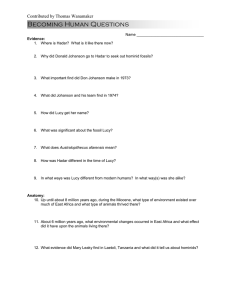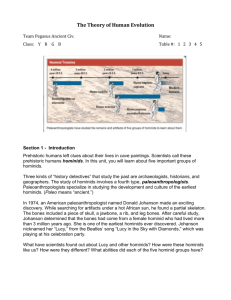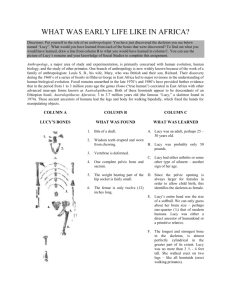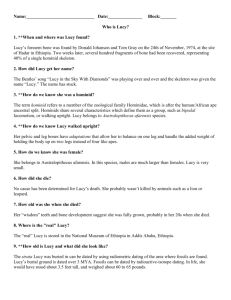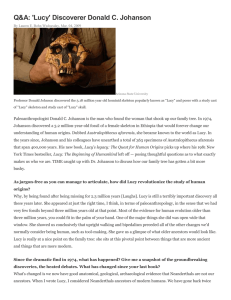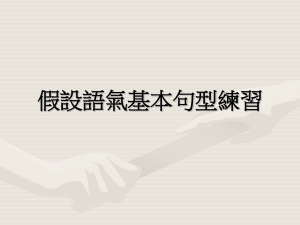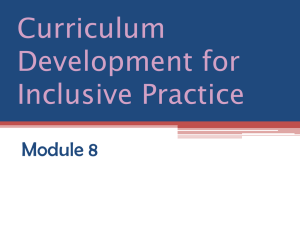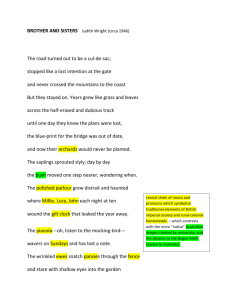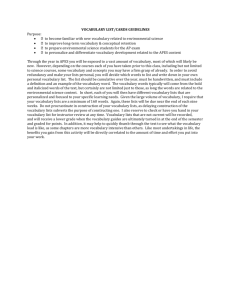Name:
advertisement
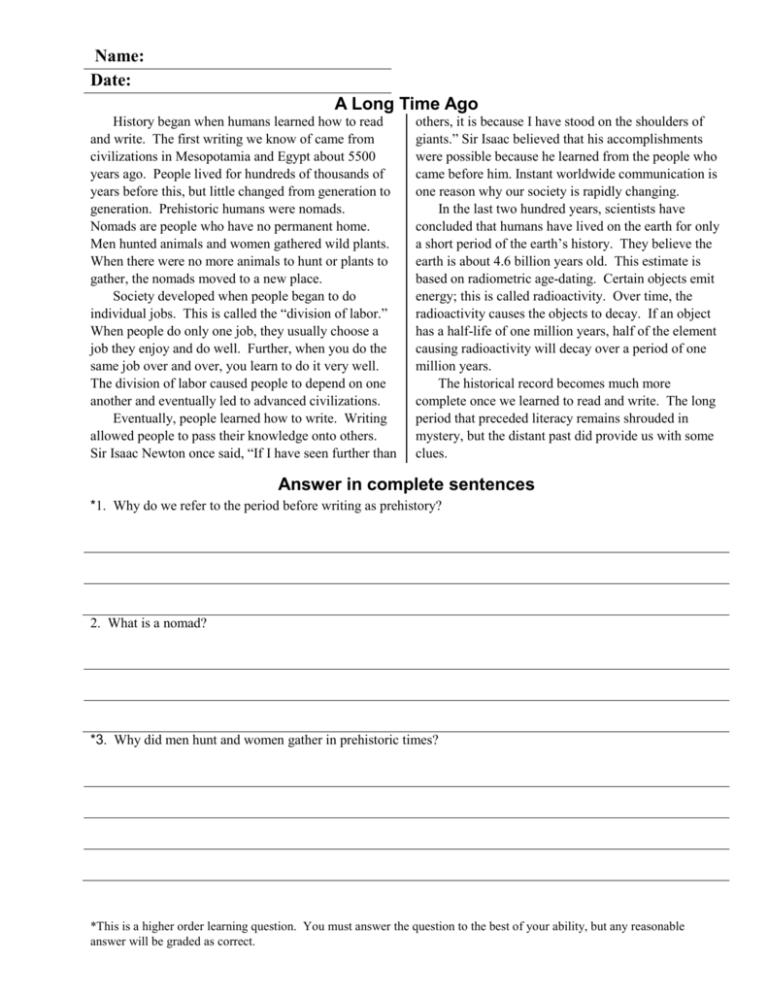
Name: Date: A Long Time Ago History began when humans learned how to read and write. The first writing we know of came from civilizations in Mesopotamia and Egypt about 5500 years ago. People lived for hundreds of thousands of years before this, but little changed from generation to generation. Prehistoric humans were nomads. Nomads are people who have no permanent home. Men hunted animals and women gathered wild plants. When there were no more animals to hunt or plants to gather, the nomads moved to a new place. Society developed when people began to do individual jobs. This is called the “division of labor.” When people do only one job, they usually choose a job they enjoy and do well. Further, when you do the same job over and over, you learn to do it very well. The division of labor caused people to depend on one another and eventually led to advanced civilizations. Eventually, people learned how to write. Writing allowed people to pass their knowledge onto others. Sir Isaac Newton once said, “If I have seen further than others, it is because I have stood on the shoulders of giants.” Sir Isaac believed that his accomplishments were possible because he learned from the people who came before him. Instant worldwide communication is one reason why our society is rapidly changing. In the last two hundred years, scientists have concluded that humans have lived on the earth for only a short period of the earth’s history. They believe the earth is about 4.6 billion years old. This estimate is based on radiometric age-dating. Certain objects emit energy; this is called radioactivity. Over time, the radioactivity causes the objects to decay. If an object has a half-life of one million years, half of the element causing radioactivity will decay over a period of one million years. The historical record becomes much more complete once we learned to read and write. The long period that preceded literacy remains shrouded in mystery, but the distant past did provide us with some clues. Answer in complete sentences *1. Why do we refer to the period before writing as prehistory? 2. What is a nomad? *3. Why did men hunt and women gather in prehistoric times? *This is a higher order learning question. You must answer the question to the best of your ability, but any reasonable answer will be graded as correct. Name: Date: Lucy Don Johanson changed a great deal of what we know about evolution when he uncovered approximately 40% of the skeletal remains of one of the oldest hominids in the fossil record. Hominids are the family of mankind and their ancestors. Johansen nicknamed his find “Lucy,” after “Lucy in the Sky with Diamonds,” a song by the Beatles. Johansen was able to find Lucy because of a lucky occurrence that was not very lucky for Lucy. Lucy apparently became entangled while walking near stream about 3.2 million years ago. She fell into the water and drowned. Her body sank into the mud and her flesh slowly decomposed. Over a long period of time, minerals from the water replaced the calcium in her bones and the bones became stones. In time, the swampy marshland turned to desert. In 1974, Johansen happened to be in the exact spot of East Africa where rainwater washed away the dirt from the now long-dried lake, and brought Lucy’s remains to the surface. Lucy’s brain was about one-third the size of the brain of a human, but Lucy had a human like characteristic: her knee could lock, so she could stand up straight. Other apes did not have a locking knee, so they could not stand for long periods of time. Johansen deduced that the locking knee gave Lucy and others like her an advantage over other apes. Until Johanson’s find, archaeologists believed that apes grew smarter, then learned to walk upright. We now know that hominid brains grew larger only after they gained this small advantage over other animals. Don Johanson’s discovery of the remains of Lucy is an example of how scientific theories change over time. Answer in complete sentences 1. What is a hominid? *2. Why did our earliest ancestors begin to include meat in their diets? *3. How did Don Johanson change what we thought we knew about prehistory? *This is a higher order learning question. You must answer the question to the best of your ability, but any reasonable answer will be graded as correct. Name: Date: Evolution Archaeologists have studied fossils and observed the close similarities between humans and apes. They concluded that we must have shared a common ancestor. Starting with the modern human skull, we can trace our family tree back millions of years. As we travel back in time, our ancestors looked less and less like us. They begin to resemble African apes with much smaller brains. Our earliest ancestors were vegetarians. They did not eat meat. Scientists believe that humans began to eat meat when the climate where they lived began to change. There was less vegetation, and the hominids were not physically suited to compete with larger animals for the remaining plants. They became scavengers, eating the meat of dead animals. The protein in the meat made their brains larger and caused a greater hunger for meat. About one million years ago, a hominid called homo erectus was more intelligent than the other animals, but there was a price to pay for having such a large brain. Getting a big homo erectus brain though a pelvis would be impossible, so natural section favored offspring whose brains continue to grow after birth. A newborn human is small enough to make the birth process possible, but their brains continue to grow after they are born. Other animals have almost fully developed brains and are active and independent shortly after they are born. Human infants, because of their brain growth, are almost as helpless as if they were still in the womb. This is because the human brain almost triples in size during the first year. The helplessness of infant children requires a family structure to support this long period of dependency. Answer in complete sentences 4. According to current archaeological theory, why did hominids begin to eat meat? 5. Explain why are human infants more helpless than the infants of other species? *6. How might our society be different if children matured as fast as other species? *This is a higher order learning question. You must answer the question to the best of your ability, but any reasonable answer will be graded as correct.
